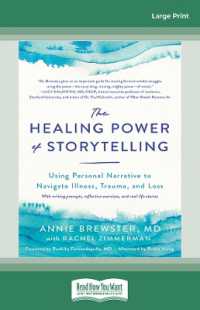- ホーム
- > 洋書
- > 英文書
- > Philosophy
Full Description
There is a tendency, in contemporary epistemology, to treat 'perceptual knowledge' and 'self-knowledge' as labels for different and largely unconnected sets of philosophical problems. The project of this volume is to bring out how much is to be gained from treating the two topics as, on the contrary, intimately connected. One set of questions that comes into view when we do concerns the sense in which perceptual knowledge, as understood from the first-person perspective, seem to be 'direct'. In a famous passage, Austin contrasted reliance on what we call 'evidence' with the way perceptual experience 'settles' questions. How should we understand the difference? In what sense is perceptual knowledge 'direct', in contradistinction to evidence-based, inferential knowledge? A connected set of issues has to do with the relationship between the epistemic authority of perception and self-consciousness. Is the way perceptual experience 'settles' questions inherently manifest to the perceiver? Is a perceiver's awareness of (e.g.) seeing that p to be explained by reference to the very capacities at work in seeing that p? Or does it reflect the operation of some kind of second-order perceptual capacity? Consideration of these matters, in turn, prompts questions about the nature of the first-person perspective. 'I can see that p' is a first-person self-ascription. But does it express the distinctively immediate kind of knowledge commonly labelled first-person self-knowledge? How would an affirmative answer to this question bear on a philosophical understanding of the 'first-person perspective'? These are rough indications of some of the ways in which reflection on the relationship between perceptual knowledge and self-awareness promises to shed valuable light on both topics.
Contents
1: Johannes Roessler and Andrea Giananti: Introduction: Perceptual Knowledge and Self-Awareness
2: Barry Stroud: The Possibility of Perceptual Knowledge
3: Barry Stroud: The Scope of Perception
4: Seeing and Thereby Knowing
5: Alan Millar: Recognitional Abilities and Knowing What One Sees
6: Appearances, Perceptual Knowledge, and Self-Knowledge
7: Perceptual Beliefs and Beliefs About Perception
8: Perception, Perceptual Knowledge, and Perceptual Self-Knowledge
9: Johannes Roessler: Perception, Knowledge, and Reflection
10: Andrea Giananti: Perception as a Rational Capacity
11: Guy Longworth: Unsettling Questions
12: Eylem Ãzaltun: Knowledge in Action and Knowledge of Perception
13: Hannah Ginsborg: Spontaneity Without Rationality: A Kantian Approach to Self-Consciousness and Perceptual Content







